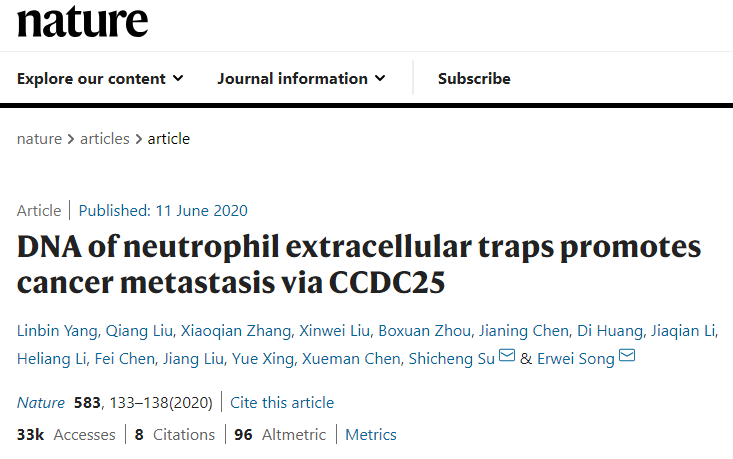The team of Professor Erwei Song and Shicheng Su from Sun Yat-Sen University recently reported the new mechanism of DNA of Neutrophil extracellular traps (NETs) promoting cancer metastasis, indicating that NET-DNA acts as a chemotactic factor to attract cancer cells and a transmembrane DNA receptor that mediates NET-dependent metastasis. This research also suggests that targeting CCDC25 could be an appealing therapeutic strategy for the prevention of cancer metastasis.
Congratulations to researcher for publishing the latest articles in the top-level journal "Nature". It is a great honor for Elabscience's products to contribute to this great scientific research achievement. Elabscience is determined to be strict with itself and be the most loyal partner of scientific research scholars!
Fundamental Information:
Title: DNA of neutrophil extracellular traps promotes cancer metastasis via CCDC25
Journal: Nature
IF:42.778(2019)
Institution of the first author: Sun Yat-Sen University, Guangzhou, China
Institution of the corresponding author:
Sun Yat-Sen University, Guangzhou, China
Guangzhou Regenerative Medicine and Health Guangdong Laboratory, Guangzhou, China
Elabscience® Products Cited:


Abstract:
Neutrophil extracellular traps (NETs), which consist of chromatin DNA filaments coated with granule proteins, are released by neutrophils to trap microorganisms. Recent studies have suggested that the DNA component of NETs (NET-DNA) is associated with cancer metastasis in mouse models. However, the functional role and clinical importance of NET-DNA in metastasis in patients with cancer remain unclear.
Here we show that NETs are abundant in the liver metastases of patients with breast and colon cancers, and that serum NETs can predict the occurrence of liver metastases in patients with early-stage breast cancer. NET-DNA acts as a chemotactic factor to attract cancer cells, rather than merely acting as a ‘trap’ for them; in several mouse models, NETs in the liver or lungs were found to attract cancer cells to form distant metastases.
We identify the transmembrane protein CCDC25 as a NET-DNA receptor on cancer cells that senses extracellular DNA and subsequently activates the ILK–β-parvin pathway to enhance cell motility. NET-mediated metastasis is abrogated in CCDC25-knockout cells. Clinically, we show that the expression of CCDC25 on primary cancer cells is closely associated with a poor prognosis for patients.
Overall, we describe a transmembrane DNA receptor that mediates NET-dependent metastasis, and suggest that targeting CCDC25 could be an appealing therapeutic strategy for the prevention of cancer metastasis.
Highlights:
1. This research shows that NETs are abundant in the liver metastases of patients with breast and colon cancers and serum NETs can predict the occurrence of liver metastases in patients with early-stage breast cancer.
2. It was found that NET-DNA acts as a chemotactic factor to attract cancer cells.
3. The transmembrane protein CCDC25 as a NET-DNA receptor on cancer cells that senses extracellular DNA and subsequently activates the ILK–β-parvin pathway to enhance cell motility.
4. The researchers put forward that targeting CCDC25 could be an appealing therapeutic strategy for the prevention of cancer metastasis.



